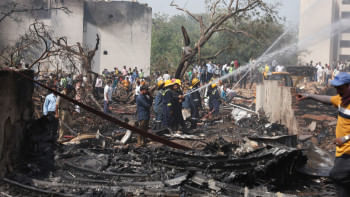An ever shrinking space

I have been searching for an apt translation for ghreena ever since I read a comment on a Facebook page carrying a story on sexual harassment on the streets of Dhaka. The comment read something like this: I have ghreena for individuals who harass pedestrians but I have even more ghreena for women who don't cover their bodies adequately. I saw the comment a minute after it was posted, but in that time it had already acquired 45 likes. In the world of instant gratification, instant social support, instant backslapping, there was no space to contest that man's ghreena. He had been congratulated for speaking for a segment of the people who, as repayment, used ad hominems to attack whoever had the courage to argue with him. A mini-cult was created. Barriers to entry were set. Another set of us and them put in place.
And that created a ghreena in me, which is why I know that ghreena is not the same as hate. Ghreena has an element of disgust that hate does not. And I felt ashamed for feeling what I felt. Because in that moment I too became a pawn in the game of us and them. I had allowed one man's extreme views to alienate me, prevent me from wanting to understand where he came from and what caused him to think the way he did. In that moment, there was no space for a conversation. There was a lapse in the inherent human want and need to understand another person. There was only a space for judgment, where all parties thought they were better than the other. Till that feeling passed.
And then Rajon was beaten to death. And the ghreena in me returned, when I saw a repetition of that same cycle of posting on Facebook, this time a video featuring the killing, the congratulatory messages, the celebration, the many "likes" followed by protests and then protests about sharing a video that hurt the senses so brutally. And again, I was ashamed because the ghreena I felt for the killers was perhaps the same ghreena that they had for the boy they killed. I could say mine was justified; but if you asked them, they would say the same.
So maybe it's ghreena, this pervasive feeling of hostility, hatred, and disgust built into a mass of rage that is one of the biggest problems with the world today. After all, we are so very quick to feel that deep, writhing emotion that clouds all judgment, blinds all vision, and divides all of humanity. But the question remains: where does this come from?
The cycle of impunity
Lionel Nichols in his book International Criminal Court and the End of Impunity in Kenya says, the state "must not only secure criminal convictions and a commitment to the rule of law, but also restore public confidence in the functioning of the criminal justice system" to end not just the culture but the cycle of impunity.
In Bangladesh, we are smack in the middle of that cycle. The cycle is such that a culture of impunity breeds a culture of impunity. In order to break that cycle, the wheels must be taken apart and those wheels could be certain people sitting on top who benefit from the maintenance of this cycle, or certain policies that reinstate public trust and faith, or the building of "good" citizenship and empathy (but not in the name of nationalism, but in the name of humanity). Or all of the above. But let us take a moment to understand that cycle.
In Bangladesh, the culture of impunity is not just the idea that those who commit crimes will not be held accountable, but that those who have power and money will not be held accountable. The best example is perhaps the war criminals who amassed wealth and political power and escaped being held accountable for rape and murder for over 40 years. And the most recent example is of Rajon's killer paying Tk. 6 lakhs to get out of jail and out of the country. Such examples of injustice, lack of due process and integrity in legal processes, and corruption and rent-seeking in public institutions lead to several outcomes that feed into the cycle of impunity:
1) It creates vigilantism and militia in the name of protecting the people, which end up perpetrating violence including mob violence. This is perhaps the category under which Rajon's killers fall. Rajon allegedly stole food, and so they took matters into their own hands, even when Rajon asked to be turned in. In the same vein, all the people who wanted to kill Rajon's killers the way they killed Rajon would fall under this category had they actually done what they wanted to do.
2) There is an increase in police brutality and oppression as government officials and law enforcement personnel are entitled to break the law, using the rise of militia as an excuse to use force. The extensive use of extra judicial killings, more popularly known as death during crossfire, is an example of this. When individuals are arrested, they have to be brought under the auspices of the law, not killed in crossfire. But in a country where the law can be bought and sold, this is inevitable.
3) Citizens live in fear and cynicism that results in under-reporting of crimes, frustration, and self-censorship. The frustration of the people is perhaps evident from the number of people who protest now than they used to, online and on the streets (and for that we can perhaps thank the anti-Ershad movement in the 1990s and the Shahbag movement of 2013 for teaching our people that they can take to the streets, that they indeed have a voice).
4) Increase in crime rates as the culture of impunity becomes the norm. And then, back to square one.
As the cycle continues, ghreena becomes a part of citizenship, part of people's everyday experience. In an unequal world, perhaps nothing else is left and that's why we have ghreena, the lowest common denominator; we direct it towards everything that makes us uncomfortable, challenges our sense of safety, being, knowledge, understanding. And we strike because it is only in that moment that we feel that we have power.
The writer is Assistant Professor at the School of Social Work, University at Buffalo, SUNY.

 For all latest news, follow The Daily Star's Google News channel.
For all latest news, follow The Daily Star's Google News channel. 



Comments